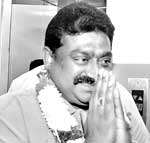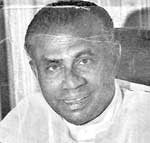
Whither the Ceylon Workers Congress
Today the Indian community in Sri Lanka is in dire need of an umbrella organization with leadership. This community comprises not only the Tamils of recent Indian origin but also the Bharathas, Borahs, Malayalees, Paravas, Parsis, Sindhis and Muslims of Indian origin. In this context it is necessary for the younger generation to know the great commitment and sacrifices of former leaders such as the late Peri Sundaram, Ramanujam, Rajalingam, Vythillingam, Vellayan and Velupillai who belonged to the Indian Tamil Community. Equally important are the names of those of the Indian Community – H.M. Desai, A. Aziz, G.R. Motha, I.X. Perera and D.M. Vora who in the early stages were the pioneers of the powerful Ceylon Indian Congress (CIC) which was established in 1939. In 1940 the Ceylon Indian Congress Labour Union (CICLU) was formed under the leadership of the late Peri Sundaram. It was the largest trade union in the country with a massive membership of 180,000. Later it took the name “Ceylon Workers' Congress” in the early fifties and was given pride of place in Sri Lanka’s trade union and political fields by veteran leader Saumyamoorthy Thondaman.
The recent developments centering round the re-acceptance of ministerial portfolios and perks have raised the eyebrows of all and sundry especially in the context of earlier CWC events, such as the sudden relinquishment of portfolios, the wage demand, repudiation of the Collective Agreement, call for major strike action, and last but not least the Basil Rajapaksa fiasco.A cloud remains over all these issues and pose serious consternation and confusion in the minds of all, particularly the members of the plantation community as they are unable to discern the motives and circumstances that led to the re-acceptance of Ministerial portfolios by the CWC the day following the wage deal at Tesmple Trees. These are matters which the CWC leadership needs to explain. After all the Rs.30/- increment in the basic daily wage of Rs.170/- can best be described as an ad hoc addition to an existing lop-sided plantation wage structure that is both unrealistic and unfair by the plantation workers. Also the plantation workers will be bound by a further period of one-and- a- half to two years by the new Collective Agreement. This, unfortunately, has come in the wake of the promise of a substantial wage increase and a decent regular income for the plantation worker and his family by the CWC and other major plantation trade unions. Critics allege there has been a major let down particularly in the context of the clarion call by the plantation trade unions for major strike action to achieve these demands. There is also a feeling per se among the plantation community and the rest of the country that the recent wage increase of Rs.30/- (plus a minimum monthly income of Rs. 5,000/-) was offered at the behest of President Rajapaksa and the CWC and other two unions succubed to this settlement with the CWC leaders once again taking their oaths as Ministers the following day. History has and will continue to judge both the late S. Thondaman and Peri Sundaram who are regarded as elder statesmen for their invaluable contributions to trade unionism and politics in this country as well as their yeomen service to the Indian community. Both were Presidents of this great umbrella organisation, which is now led by Arumugam Thondaman. They were also elected Members and Ministers in the State Legislature. Arumugan Thondaman inherited a great legacy from his grandfather, the late S. Thondaman in the political and trade union arenas – a legacy which he as a scion of the Thondaman family could well be proud of. When he assumed the mantle of the CWC leadership in the late nineties, it was at a time when some seniors in the CWC had left its ranks and were embroiled in a bitter vendetta with the CWC in and out of Court. It remained to be seen whether Arumugam would withstand or succumb to such onslaughts. To his credit it need be said that he successfully braved these attacks and stamped his position as its leader. The late Thondaman was able to successfully utilize both trade union and political clout with great skill, patience and fortitude. The results he achieved are well known. Loyalty (and even gratitude) to a ruling party and alliance which he supported and the price that he was willing to pay was always, if not often dependent on the value or benefit he could derive for the community of persons of recent Indian origin, who were and still continue to be greatly disadvantaged - economically, socially and politically. Posterity no doubt will judge the present CWC leader by his contributions in the political, trade union and socio-economic life of this country. His critics (and there are many) continue to brand him in several ways - Machiavellian, self styled messiah of the plantation workers, playboy politician, opportunist etc. No doubt they will sound harsh and unkind, particularly when some of these critics are his bitter rivals in trade union and political activities and are themselves not above reproach. Many of them continue to live in glass houses in the same way that some of his lieutenants in the CWC do. Be that as it may, what has really come into focus among all and sundry is the all important question -can the CWC claim any credit for the wage increase granted? In the backdrop of the recent events, the CWC’s Convention on Friday provided an ideal opportunity for the leadership to elicit from and analyse the delegates’ views and suggestions to take the CWC forward on a new course with a vision and strategy for its membership as well as the Indian Community. CWC conventions serve as a platform for the leadership to seek a mandate from its membership to charter a path which will lead to the attainment of short and long term goals of the community. This mandate will give the CWC leadership the opportunity to re-assert its role in the political firmament and emerge as an independent and fearless party whose role as a partner in any government or ruling alliance now or in the future will be dependent on the acceptance of CWC’s policies and the mandate of its own people – thus getting the message to any government that acceptance of government office is only a means to achieve the aspirations and goals of the Indian community. By doing so, the CWC will be able to re-establish its role as a credible trade union and political force and no longer to be swayed or influenced by carrots dangled before it by the ruling political parties in the country. In the above context the following suggestions are made: (1) CWC should transform itself into an Umbrella Organisation of the entire Indian Community. This can be done following a past practice of the Ceylon Indian Congress – a merger of over 25 organisations by which it was able to earn the respect and confidence of the entire Indian Community. For this purpose- there are several persons in all walks of life – educated/experienced/having resources/enjoying eminence in their chosen fields in this country who will be more than willing not only to extend their goodwill and support but will also actively get involved in assisting the leadership to achieve its objectives. (2) CWC needs to identify itself with national issues in addition to championing the cause of the minorities, by speaking out boldly inside and outside Parliament and at Cabinet level on such issues as (a) preservation of human rights, (b) law and order, (c) plight of I.D.Ps (d) arbitrary arrests and detention (e) abductions, killings and disappearances, (f) negotiated settlement of ethnic issue and (g) fiscal and monetary policies. (3) Instead of depending on political handouts for its survival in return for its support to a party or alliance in power, the CWC should by deeds more than words or flexing of muscles demonstrate its political credibility and viability. (4) The CWC needs to reach out beyond the domain of the plantations to the urban and cosmopolitan areas where significant numbers of persons of recent Indian origin reside and work. To achieve this it must get involved in their socio-economic and political problems and their resolution. (5) CWC thinking and decision making at its leadership level must be people-oriented and transparent leaving ample room for dialogue, consultation and constructive criticism at all levels of the community. By doing so the CWC will be able to re-establish its image and reflect itself as a democratic body and not be regarded as an oligarchy. (6) Political support extended to a ruling party or alliance in power should be result-oriented, purely for the benefit of the community the CWC represents. Playing the numbers game would be disastrous in the long run and detrimental to the people of Indian origin.
In that context there can be a firm commitment to the government based on the above criteria with an equally important reciprocal commitment that will ensure benefits to the Indian community. Switching sides frequently in the political arena could end in failure. It could lead to an erosion of confidence by the Indian community and overall adversely affect the credibility of the CWC amongst all.
|
|| Front
Page | News | Editorial | Columns | Sports | Plus | Financial
Times | International | Mirror | TV
Times | Funday
Times || |
| |
Reproduction of articles permitted when used without any alterations to contents and the source. |
© Copyright
2007 | Wijeya
Newspapers Ltd.Colombo. Sri Lanka. All Rights Reserved. |

